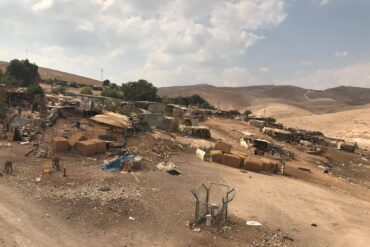To fully appreciate why Israel fasts over the assassination of G’dalia ben-Aḥikam, it’s important to view events from the perspectives of both G’dalia and his assassin Yishmael ben-Netania – both of whom likely saw themselves acting justly on behalf of their people.
The historical context making G’dalia such a difficult figure to mourn at first glance is that he was a client governor for the Babylonian Emperor Nevudkhadnetzar who had just destroyed Jerusalem and dismantled the Davidic dynasty. It’s understandable that Yishmael – a descendant of King David – would have related to G’dalia as a traitor for representing Babylonian interests.
While some might claim that because Yishmael forged an alliance with another regional king, Baalis of Ammon, he had forfeited his right to attack G’dalia’s connection to Nevudkhadnetzar, a closer look at the regional dynamics of that time reveals that Yishmael’s alliance with King Baalis was in order to coordinate the Judean and Ammonite struggles against the Babylonian Empire – the motivation for which would have been freeing Judea from foreign rule.
An alliance with Ammon based on a shared need for liberation from imperial rule cannot be compared to G’dalia representing interests of that imperial rule in Judea.
As a descendent of King David fighting for Hebrew independence, Yishmael likely felt a patriotic duty to cut down the emperor’s Jewish client governor. But pure motivations and a just cause still carry an obligation to see a larger picture and to weigh the potential consequences of such a high profile assassination.
From the other side, G’dalia was simply trying to do the best he could for Judea under the conditions that existed. Being close to the prophet Yirmiyahu (who David’s descendants and their supporters mistook for a traitor), G’dalia was being pragmatic under the circumstances. Because he really wasn’t a traitor but was actually trying to prevent Judean society from falling apart in the wake of a major national catastrophe, it was probably difficult for him to understand that others viewed him as such. This would explain why his guard was down – he and Yishmael likely saw their disagreement in a very different light.
The Rambam teaches in Hilkhot Taanit 5:2 that what we are really fasting over on Tzom G’dalia is the complete loss of Hebrew independence in Eretz Yisrael. Despite being a puppet governor appointed by the foreign emperor who had just destroyed Jerusalem’s Temple and exiled her people, G’dalia was – according to the Rambam – the last ember of Judean self-determination.
We mourn G’dalia’s death on the third of Tishrei each year because – despite him being a vassal appointed by a hated foreign ruler – he represented the last tiny thread of Hebrew sovereignty in our land. But just as it was clearly a mistake for Yishmael and his supporters to vilify G’dalia then, it might also be a mistake for us to vilify Yishmael now.
The primary message we should take away from this national fast is the need to appreciate the spiritual value of the Jewish state we currently have, despite its obvious shortcomings and the sometimes disappointing behavior of Israeli political leaders. According to the Rambam’s position on Tzom G’dalia, even a small thread of Jewish independence has spiritual value worth cherishing.





